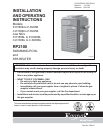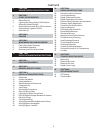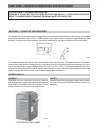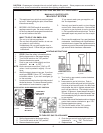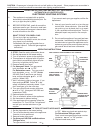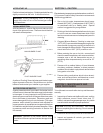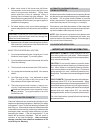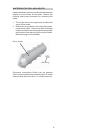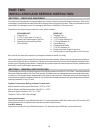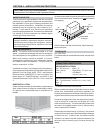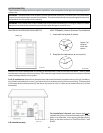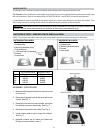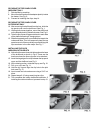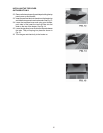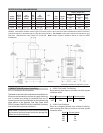
4. Make visual check of the burner and pilot flame.
Flame pattern on the main burner and pilot is indi-
cated in the previous illustration. Yellow flame
means restriction of the air openings. Lifting or
blowing flame indicates high gas pressure. Low
flame means low gas pressure. Should this occur,
shut the heater off and contact your gas supplier or
qualified service agency.
5. On indoor heaters, clean room intake openings to
assure adequate flow of combustion and ventilation
air.
6. Keep area around heater clear and free from combus-
tible materials, gasoline and other flammable and
corrosive vapors and liquids.
BASIC TIPS IF HEATER WILL NOT FIRE:
1. If you have no electrical power; it may be your "circuit
breakers" have tripped. Try re-setting them.
2 If you have electrical power but the heater will not fire
check the following:
3. The time clock must be moved to the "ON" position.
4. Your pump strainer basket may be full. If so remove
debris.
5. Your filter may be dirty. If so, backwash or clean
filter. (To tell if your filter is dirty, look to see if the
filter pressure will be higher than usual).
6. The pump may have lost it's prime. It may be run-
ning dry, check the pressure on the filter. If there is
no pressure; then you are not moving water (or your
gauge is broken). Try to get the pump to run at it's
normal flow rate.
POOL & SPA WATER CHEMISTRY
Chemical imbalance can cause severe damage to your
heater and associated equipment. Maintain your water
pH between 7.4 and 7.8 and total alkalinity between 100
and 150 p.p.m. If the mineral content and dissolved solids
in the water become too high, scale forms inside the heat
exchanger tubes, reducing heater efficiency and also
damaging the heater. If the pH drops below 7.2, the
heater will be severely damaged. This will result in
corrosion of the heat exchanger. Heat exchanger
damage resulting from chemical imbalance is not
covered by the warranty.
AUTOMATIC CHLORINATORS AND
CHEMICAL FEEDERS
All chemicals must be introduced and completely diluted
into the pool or spa water before being circulated through
the heater. Do not place chlorine tablets or bromine
sticks in the skimmer. High chemical concentrations will
result when the pump is not running (i.e. overnight).
Chlorinators must feed downstream of the heater and
have an anti-siphoning device to prevent chemical back-
up into the heater when the pump is shut off.
NOTE: High chemical concentrates from feeders and
chlorinators that are out of adjustment will cause very
rapid corrosion to the heat exchanger. Such damage is
not covered under the warranty.
COLD WEATHER OPERATION
8
CAUTION: Combustion air must not be contaminated
by corrosive chemical fumes which can damage the
heater and void the warranty.
MODERATE CLIMATE: Heater operation can con-
tinue during short term cold spells. When tempera-
tures are below freezing, flow (continuous pump opera-
tion) must be maintained.
CAUTION: Do not use the heater to maintain water
temperatures just above freezing or for freeze protec-
tion. When heater is used during freezing weather,
care must be taken to avoid freeze ups. Continuous
pump operation is a must. Additional protection may
be required. The heater is not warranted against freeze
ups.
COLD CLIMATE: Prolonged operation with water tem-
peratures below 50°F is not recommended. When
starting the heater with pool temperatures below 50°F
operate the heater continuously until higher tempera-
tures are reached. Operating the heater for prolonged
periods with pool water below 50°F can seriously
damage the heater, and is not covered by the warranty.
For cold climate areas, please follow the winterizing
procedures listed.
IMPORTANT FREEZE INFORMATION



